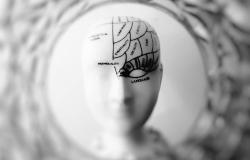Fighting the Global Amygdala Fire

We must transition to a brain-positive economy, a global goal to stop and reverse the loss of brain capital, which puts a premium on brain health and brain skills in accomplishing socio-economic objectives.
Much like nature science needs the world to understand that the Earth is like a giant organism - Mother Earth - and is all connected and in balance; we must see global human society as one vast brain with media and culture acting like connections between neurons (people).
Recently, I had a wonderful conversation with an Argentine lady on a ferry ride from Buenos Aires, Argentina, to Montevideo, Uruguay. We discussed life, society, and brain issues, fresh on my mind after presenting to the Argentine Congress. However, she exclaimed that with the rise of Javier Milei, the new radical, populist Argentine President, hers and the country's amygdala (emotion center) were ‘on fire.’ Stress and fear are rampant, she noted, making it more challenging to survive and thrive.
Indeed, she is probably right about the brains of her fellow citizens. There is a range of studies showing societal megatrends negatively influencing our brains. For example, a 2022 study correlated large-scale United Kingdom biobank data over 14 years with the local stock market index and residents’ mood. They showed maximal stock market volatility was associated with volumetric measures of affective brain regions. Similar outcomes were seen in brain scans after earthquakes, warzone experiences, 9/11 terrorist attacks and the COVID-19 outbreak.
As I reflect on this profound point by my new Argentine friend, I believe the global amygdala is on fire. The Gallup 2023 Global Emotions Report of data from 2022 noted global unhappiness remains at an all-time high set in 2021.
Furthermore, the flames of this fire will be fanned in 2024 when a large chunk of the global population is voting in a national election and mis- and disinformation, and political volatility are rapidly escalating. There are major concerns with trends suggesting democracy strength is weakening, on average, around the world.
In a globalized world beset by complex and interconnected challenges, it is our shared biology and chemistry that connects us, i.e., our brains.
As colleagues and I noted in a recent paper, economic, political, and climate-driven psychological stress are all rising, and democracy indices are weakening. Advanced AI is cannabalizing parts of human cognitive function. Mis- and disinformation are proliferating, causing people to lose or seriously question their realities. The current economy seeks efficiencies that squeeze workers and erode their brain health. It is a brain-unhealthy economy. It is not surprising that mental and neurological disorders are on a steady march of increase, costing trillions to the global economy and threatening the economic security of nations.
A global amygdala fire would look like an emotional response of larger groups that is rapid, and overwhelming. It is characterized by either a fight or a flight response. We all observe either major overreactions or paralysis, respectively.
Typically, analysis tries to rationalize and explain disparate events and their effects on citizens; however, we must connect them. I suggest we could connect them, given they all impact our brains individually and as communities. It will open up new avenues for solutions.
Clearly, we are moving into a new economic paradigm that is even more demanding on our brains.
The transition from a brain-unhealthy economy to a brain-healthy economy (aka brain economy) is akin to the transition from a nature-negative economy to a nature-positive economy. We are steadily on this road with regards to nature, and it has meant understanding the numerous ways we are damaging our environmental ecosystems, from forests to oceans, and therefore there are widespread policy, technological, and investment solutions to make the nature-healthy economy.
The brain economy we are transitioning into is hyper-knowledge intense, driven significantly by humans co-piloting their tasks with advanced AI, and characterized by an epoch where there is a renaissance of brain science and widespread public discussion on mental and brain health disorders (e.g., depression, attention deficit hyperactivity disorder, and addiction). A brain economy places a high value on citizens, their brain health, and brain skills, collectively known as their brain capital. A brain economy invests major time, attention and resources in building brain capital. Transitioning to a brain economy is vital as over 50% of the globe goes to the polls in 2024, and citizens are worried.
We live in a time of a brain science renaissance which unlocks many new opportunities. Gene editing affords potential new cures. Massive data capture from miniaturized sensors and low-cost genomics has never been easier. Powerful algorithms crunch this vast and complex data. These advances must be celebrated and will rapidly accelerate our understanding of the brain, and how to drive brain health.
Amidst all these challenges, there is reason for hope; however, we all must engage in an economy-wide movement. The brain economy would quench the amygdala fire.
E.O. Wilson noted, ‘We have Paleolithic emotions, medieval institutions, and Godlike technology’. We must innovate on these three key levels - manage our emotions, reform our institutions, and technologies for good.
At a personal level, we can all act to soothe ourselves and better navigate the changing world. Beyond all of the well-known brain health activities like exercise and healthy eating, we can all work on our spiritual fitness. Our spiritual fitness is defined as optimizing our life energy to foster a powerful sense of connection with something greater than the self - it could be nature, God, humanity, or everything in the universe. We can also take steps to improve our mental immunity, quickly spot and shed problematic information as one's body does this to infectious diseases. In an effort to improve social cohesion and reduce social isolation, David Brooks, the famed New York Times opinion columnist, suggests in his new book, the importance of engaging with strangers deeply. He coaches on asking meaningful questions such as ‘What’s your story?’ or ‘What do you love to do in your spare time?’.
Uplifting news can provide an emotional buffer against distress. So it’s important to note that in 2023 many positive things happened. The WHO approved a new and affordable malaria vaccine, the FDA approved a groundbreaking pill to treat postpartum depression, and two sickle cell disease treatments gained approval.
Significant investments are occurring in youth mental health. For example, Kooth, a web-based provider of mental health services for school-aged children, funded by the Pennsvylania Government had 92,184 students access their services across the state over five months between November 2022 and March 2023. Nearly 65% of students felt they needed professional support, but they did not feel comfortable speaking to friends or a family member about their mental wellbeing. Kooth has also been selected by the California Government to provide services to all Californians between ages 13 and 25.
Institutional trends are moving in our favor that can help the global amylgdala. More than three dozen states are suing Meta, the parent company of Instagram and Facebook, over fears that its platform’s ‘addictive’ features are harming teens’ mental health. We may wish to take lessons from the Chinese Government who has announced rules to reduce spending and rewards on video games in an effort to tackle gaming addiction. This is a further step from China which in 2021, set strict playtime limits for under 18s.
At the level of global economics, colleagues and I have managed to insert brain capital in a range of major fora, e.g., the United Nations General Assembly’s Science Summit, COP28, Wharton Neuroscience Summit and the World Economic Forum. This helps us advance the transformative idea that Brain Capital is pivotal to the brain economy and should be viewed as crucial as GDP and road and bridge infrastructure by heads of state, senior ministers, and business leaders.
New financial mechanisms may help in the transition to the brain economy. So-called 4P models (public-private-philanthropic partnerships) are well suited to addressing complex brain economy challenges. Such challenges require deep, system-level transformation, which in turn requires an understanding of the needs and constraints of a broad set of actors, the ability to bring these actors together around well-defined objectives, the willingness to take a longer-term perspective, the capacity to run a robust day-to-day operation, and an appetite for experimentation. The Baycrest Centre for Aging + Brain Health Innovation is an exemplar that has received diverse funding from across Canada and has created a successful industrial innovation approach of solutions for late-life brain health (e.g., depression, dementia, and anxiety). 4P models need to be stood up across the lifespan to optimize early childhood brain development, learning disorders, neurodiversity, youth mental health, and dementias.
More must be done in 2024 to advance this just transition to a brain economy in an attempt to fight the global amygdala fire. Let’s work together on it - in our daily lives, in our communities, and places of work. We must do this to stabilize our economies and strengthen our democracies.
Harris A. Eyre, MD PhD, is a fellow in brain health at Rice University’s Baker Institute for Public Policy, a senior fellow at the Meadows Mental Health Policy Institute, a research fellow with Stanford’s Frontier Technology Lab, an instructor at the Global Brain Health Institute, a member of the Brain Health Collaborative Policy Working Group (powered by the Institute for Health Metrics and Evaluation), a member of the Champion’s Cabinet of the Davos Alzhiemer’s Collaborative, and advisor to the Euro-Mediteranean Economists Association, the Latin American Brain Health Institute, and Mental Wealth Initiative.
Photo by meo


